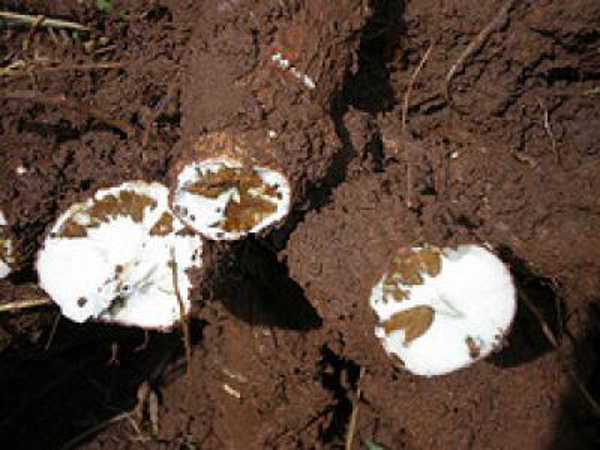News
NARO supports Kenyan counterpart to successfully lodge GM cassava application

CBSD-free Cassava is set to be adopted faster in Kenya than Uganda where it originated
Kenya’s top agricultural research body the Kenya Agricultural and Livestock Research Organization (KALRO) has successfully submitted its application for the commercial release of a Genetically Modified variety that is resistant to the Cassava Brown Streak Disease (CBSD).
The Kenyan researchers received support from their Ugandan counterparts in the National Agricultural Research organization (NARO) and the American-based Donald Danforth Plant Science Centre, to develop the application, using years of similar research to develop GM cassava varieties in confined field trials in Kasese and Namulonge.
According to the International Service for the Acquisition of Agri-Biotech Applications (ISAAA), KALRO’s application was accepted by the National Biosafety Authority (NBA) of Kenya.
The application is now set to undergo a science-based review process by the NBA, together with relevant regulatory agencies and independent experts, to ascertain that genetically modified CBSD resistant Cassava Line 4046 is safe to human and animal health, and to the environment.
The move, likely to be seen as a slap in the face of Ugandan authorities who rejected the technology largely on ideological grounds, has been hailed as an important degree of collaboration by the scientific community in the region and internationally towards defeating one of the most destructive crop diseases for one of the most important crops in the region.
Ugandan scientists at the Namulonge-based, Virus Resistant Cassava for Africa (VIRCA) centre of Excellence that has sponsored cassava research for over fives years, revealed last year that numerous laboratory and field trials of GM cassava had proved successful in defeating the Cassava Brown Streak Virus (CBSD).
Dr. Andrew Kiggundu, who was one of the key scientists that developed the GM Banana resistant to Banana Bacterial Wilt, is leading the Africa Programme of the Donald Danforth Centre which is championing the adoption of GM cassava in Kenya, Rwanda and Mozambique. He told The Sunrise last year that the programme was shifting focus away from Uganda due to the legislative hold-ups.
The Cassava disease CBSD, which leads to rotting of roots, is widespread across most parts of East Africa, can cause up to 100 percent loss in yield. Farmers consider it a major risk to any large-scale operation as it can cause widespread losses.

Cassava Brown Streak can destroy up to 100 percent of the crop when infected
Although Uganda led all other countries in Africa in developing GM varieties that are resistant to CBSD, regulatory obstacles that included several failed attempts to pass an enabling law for commercial release of GM crops, has allowed neighbours Kenya, Ethiopia and soon Rwanda not only to overtake us, but also utilise our experience and years of investment to fast-track their cassava programmes. Ethiopia recently approved confined field trials of GM-tela maize that is resistant to drought and the Fall army worm.
Cassava is one of the most widely used agricultural raw materials in the world and its usage spans the pharmaceutical sector to textiles, food, energy, beverages and chemical industries.
Although President Yoweri Museveni recently revealed his government plans to develop the crop’s value chains, scientists note that this will be hampered by the lack of enabling policies that ensure greater productivity and reduced risks. A GM cassava variety that withstands the CBSD, is considered the best chance of developing the cassava value chain because of the reduced risk of loss from the commonest disease around.
ISAAA says that NBA’s move to accept the application is a milestone achievement in improving agricultural productivity for farmers in East Africa.
“CBSD-resistant cassava line 4046 exhibits high levels of resistance to infection by the two plant viruses that cause CBSD through a well-known gene silencing mechanism (RNAi). Farmers and consumers will benefit from CBSD resistant cassava as a result of increased cassava root quality and marketable yield,” says ISAAA’s Executive Director, Dr. Margaret Karembu.
She adds: “CBSD resistant Cassava Line 4046 cassava was developed through the Virus Resistant Cassava for Africa Plus (VIRCA Plus), a consortium of Kenyan, Ugandan, Nigerian and American institutions to develop disease-resistant and nutritionally-enhanced cassava varieties to improve the livelihoods and health status of African farm families.
“The entire VIRCA Plus project team is excited to reach this milestone in improving agricultural productivity for farmers in East Africa. A positive decision by the Kenya NBA would allow us to move ahead in bringing disease-resistant versions of superior cassava varieties to breeders and farmers.
If approved, the effort by Ugandan scientists and their counterparts in Kenyan could help Kenyan farmers leapfrog their competitors in the region to realise the fruits of the science that has divided opinion in many parts of the world.
But also, NARO could use its participation in the rigorous application process in Kenya to better prepare for future applications, in case the Ugandan government changes its mind on allowing GM crops to be commercialized.
Comments



























